
Tainted Grail: The Fall of Avalon Classes: Which Archetype The Best?
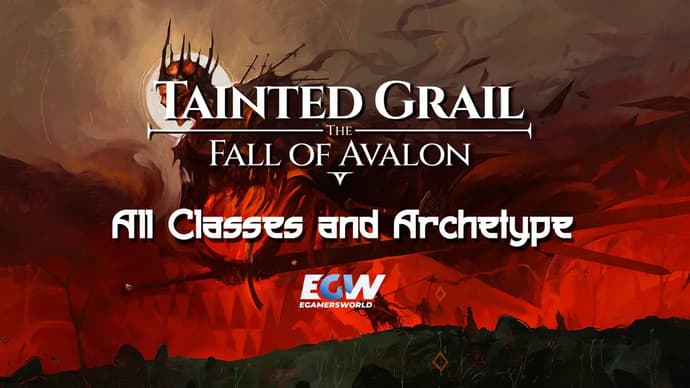
Tainted Grail: The Fall of Avalon is a dark open-world RPG where you write your own story. And like in any good RPG, one of the first things you'll face is choosing who you'll be on your journey.
But unlike the usual setup where you create a character and pick a class before the game even begins, here the developers took a more interesting approach. You'll have to make a seemingly simple — yet important — choice that quietly determines your class.
So, let’s dive in, and I’ll explain how classes and archetypes work in this game.
All Classes (Archetypes) in Tainted Grail: The Fall of Avalon
At the moment, the game offers four main archetypes, each with its own subtypes and stat bonuses. Understanding these basic archetypes will help you get comfortable with the gameplay and make the most of your experience.
In Tainted Grail: The Fall of Avalon, every player begins their journey in a cramped prison cell, where you're asked just a couple of questions. Your answers determine who you'll become upon release — a warrior, a mage, a hunter, or someone who walks a path of their own.
While you’ll eventually be able to develop any skills and combine classes freely, your initial choice does matter. It sets the tone for your early-game experience and can either ease you in or make the start more challenging. So, let’s take a closer look at each archetype in this grim Arthurian world.
Warrior
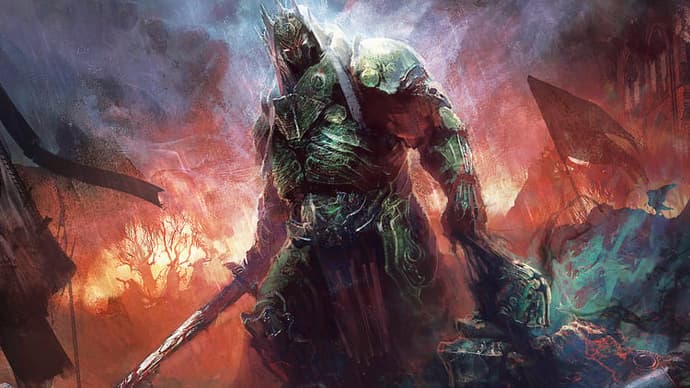
The warrior is a class for those who prefer a straightforward playstyle. Did you say you were on your way to join the army? Then you’re clearly ready for battle. At the start, you get bonuses to health, strength, and defense. The development path here ranges from a classic infantryman with sword and shield to a battlemage who combines spells with heavy weaponry. You can even become a healer focused on survivability and close combat.
The warrior’s main strength is reliability. You can take a hit, smash enemies face to face, and not be afraid of direct confrontation. However, without good gear, you’ll fall apart quickly — this archetype heavily relies on solid weapons and armor. And while it’s durable, its combat control options are limited: mostly brute force and survivability, without many tricks.
Warrior Pros:
- High survivability from the start
- Easy to play and learn
- Strong in close-quarters combat
- Consistent damage across all stages of the game
Warrior Cons:
- Heavily gear-dependent
- Limited control or utility options
- Difficult to build creatively without hybrid setups
As you can already tell from just this one class, Tainted Grail: The Fall of Avalon offers a surprising number of builds and development paths. And that’s just the warrior — a class often seen as boring in most RPGs, built only to soak up damage and hit things. Here, even the “standard” can surprise you.
Archer
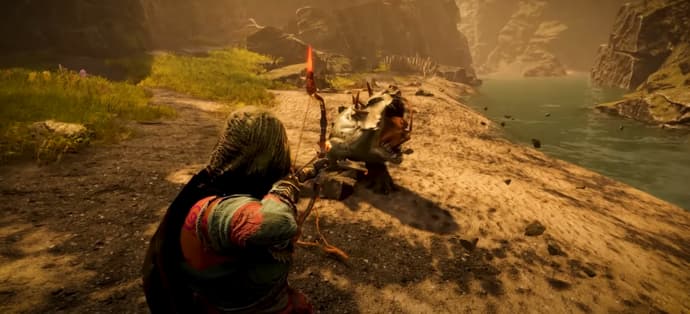
If you choose the phrase “I was hunting” at the start of the game, you unlock the path of the Archer — a character who relies on precision, stealth, and a deep understanding of the surrounding world.
Archers are strong at range. The Sharpshooter subtype is especially effective, focused on critical hits and high single-target damage. If you go with Furriery, the emphasis shifts toward crafting and survival — you'll gather more resources and gear up faster. The Cook subtype boosts the power of food buffs, giving you temporary boosts to your stats. And Alchemist turns you into a deadly and annoying foe — poisons, potions, and acids let you weaken enemies before they even get close.
But the class has its downsides. Archers are heavily dependent on consumables like arrows, potions, and food. In close combat, they’re nearly helpless, especially without good armor or evasion. Playing as an archer requires smart resource management, awareness of your positioning, and a solid understanding of what your enemies can do.
Archer Pros:
- High damage at range
- Flexible due to subtypes (poison, cooking, crafting)
- Great for exploration and survival
- Encourages strategic, thoughtful gameplay
Archer Cons:
- Vulnerable in melee combat
- Dependent on consumables
- Requires precise aiming and control
- Has a steeper learning curve early on
In general, the archer is a fan-favorite class in most RPGs. It usually splits people into two camps — those who love playing it (and their teammates), and those who hate going up against it. The key to mastering this class is all about maintaining distance, dishing out heavy damage, and doing everything you can to avoid taking hits yourself.
Rogue
The rogue is another somewhat niche class, but a very powerful one. It’s ideal for players who prefer to stay hidden and avoid direct confrontations. If you chose the dialogue option about fleeing from the guards and shady dealings, then your path is all about stealth and critical hits. Rogues excel at sneaking up on enemies, landing devastating crits, and slipping away before anyone can react.
Sharpshooter is the go-to subtype for those who rely on precision and ranged damage. If you enjoy picking off targets from a distance, this one’s for you — you track your enemy, wait for the right moment, and unleash a powerful critical shot.
Faint-Hearted, on the other hand, is all about avoiding combat entirely. This subtype focuses on stealth, evasion, and unconventional solutions. You can sneak past enemies, complete objectives quietly, gather valuable loot, and vanish before anyone even notices. A perfect choice for players who enjoy freedom and don’t want to fight unless absolutely necessary.
The rogue shines in ambushes, stealth kills, and quick eliminations. But there’s little room for error: low armor and health make you highly vulnerable. This archetype demands precision, timing, and a solid understanding of your enemies. It’s not the best pick for beginners — but in experienced hands, the rogue becomes a deadly predator.
Rogue Pros:
- High critical damage
- Great for stealth-oriented playstyles
- Quick reflexes and high mobility
- Strong in PvE against single targets
Rogue Cons:
- Very fragile
- Requires precise timing and planning
- Unforgiving of mistakes
- Difficult for players without stealth experience
There are definitely challenges, but also a strong temptation — that thrill of landing a perfect stealth crit. So if you understand stealth mechanics and enjoy that kind of gameplay, go for it. You’ll get used to the class and its unique rhythm pretty quickly — just give it a bit of time.
Mage
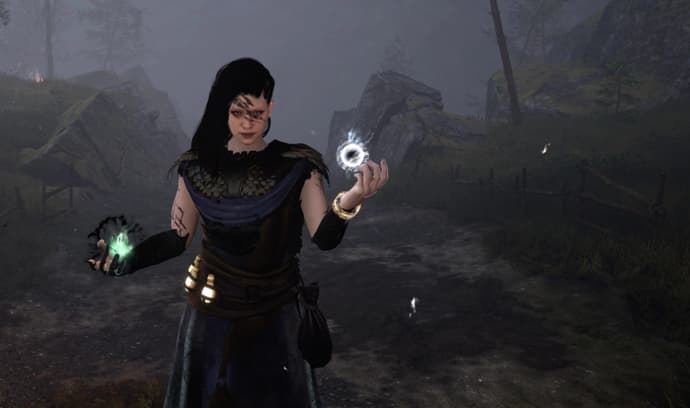
And finally — mages and magic in this world. The mage is a completely different approach to the game. If you chose the phrase “I was seeking an ancient place of power”, you become a sorcerer, mastering the elements and magical destruction.
You can go down the path of the Healer, focusing on restorative magic and support, or embrace the power of the Pyromaniac, burning everything in your path with fire spells. Mages in Tainted Grail are capable of dealing massive area damage, weakening enemies, and turning the tide of battle — all while staying safely out of reach. But that power comes at a price: early on, you’re fragile, your mana runs out quickly, and in melee range, you’re an easy target.
Playing as a mage can be difficult at first. There’s a lot to keep track of, and it can feel overwhelming — but if you push through the initial struggle, the payoff is worth it. The class requires careful positioning and an understanding of combat rhythm. If you prefer to win with brains over brawn, then magic is the path for you.
Mage Pros:
- Powerful area-of-effect damage
- Access to both supportive and destructive spells
- Can fight from a safe distance
- Offers utility, control, and crowd management
Mage Cons:
- Mana runs out quickly
- Extremely vulnerable in close combat
- Requires precise positioning and planning
- Has a tough early-game learning curve
It’s a challenging class for beginners, but like with any playstyle, it just takes a bit of getting used to. If you love the idea of magic — don’t hesitate. This class can be incredibly rewarding.
Classless
Interestingly, if you stay silent for both questions at the beginning of the game, you’ll end up without a class. This doesn’t make you weaker, but it also means you won’t get any starting bonuses. All of your attributes will be set to 10 — giving you a completely blank slate to shape however you like. You could build a warrior-mage, a stealthy alchemist, or a balanced jack-of-all-trades who dabbles in everything.
This option is best suited for experienced players who want full control over their character’s development and don’t need guidance from the game. You choose where to invest your points, how to build your character, and which direction to take. But for newcomers, it can be a tough road: no early boosts means you’re vulnerable, leveling is slower, and mistakes are more punishing. Still, it’s a great pick for anyone who loves to experiment and build something truly personal.
That said, for a first playthrough, it’s better to pick one of the established classes to get a feel for the mechanics and overall gameplay. Once you understand how the game works — then you can go wild with a custom build.
Classless Pros:
- Total freedom in character development
- Balanced starting stats
- Great foundation for hybrid builds
- Perfect for those who love full customization
Classless Cons:
- No starting bonuses or advantages
- Tougher early-game experience
- High risk of building mistakes
- Not recommended for new players or first runs
Now this is something truly unique. It’s a bit reminiscent of how things work in Skyrim, where you can eventually become anything — but here, you really start as a blank slate, and you’re free to shape your destiny however you want.
So, which class is the best?
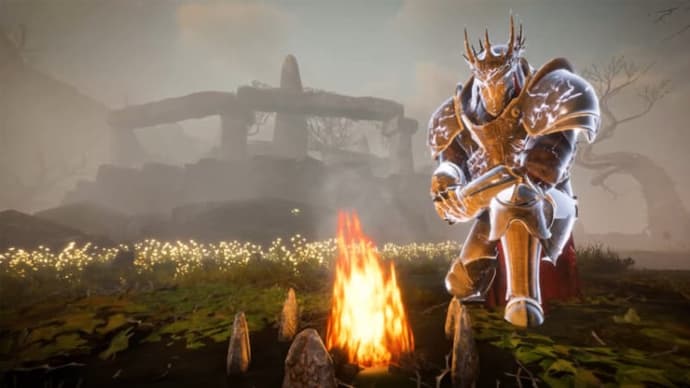
The truth is — it all comes down to your preferences and playstyle. If you're looking to simply enjoy the game without overthinking strategies, just relax and explore the world with minimal stress, then Warrior is a solid choice. That’s not to say it’s an “easy win” — no class is — but the warrior has fewer mechanics to juggle, a lot of health and armor, and doesn’t rely as much on resources like arrows, mana, or potions for damage. All of this makes the early game feel a lot smoother compared to, say, playing a Rogue.
But! “Best” doesn’t always mean “strongest.” If you’re a seasoned player looking for a challenge or a creative build, then the Pyromaniac Mage can absolutely devastate enemies with AoE, while the Rogue is unmatched in stealth and critical strikes. It really depends on how you like to approach the game.
So the best advice? Pick the class that speaks to you. Go with the mechanics that feel fun and intuitive. That’s the beauty of RPGs — you get to step into the role that fits you best and shape your story in a brand-new world.

Kirill is a writer of articles and blogs at eGamersWorld, having joined the team in 2024. His primary focus is analytics and crafting content about esports. With years of experience in gaming, Kirill brings deep industry insights to deliver high-quality and engaging materials.
 Marathon Roadmap: What Awaits Players in Seasons 1 and 2Marathon’s first two seasons are detailed by Bungie. Discover how the seasonal system works, what DEATH IS THE FIRST STEP and NIGHTFALL add, and what players can expect after launch.
Marathon Roadmap: What Awaits Players in Seasons 1 and 2Marathon’s first two seasons are detailed by Bungie. Discover how the seasonal system works, what DEATH IS THE FIRST STEP and NIGHTFALL add, and what players can expect after launch. Dota 2 PGL Wallachia Season 7 OverviewEverything about PGL Wallachia Season 7: schedule, teams, format, and $1M prize pool.
Dota 2 PGL Wallachia Season 7 OverviewEverything about PGL Wallachia Season 7: schedule, teams, format, and $1M prize pool. Genshin Impact Version 6.5: Leaked Banners, Endgame Resets and New ZonesGet ready for Genshin Impact Version 6.5. Explore upcoming banners featuring new Geo support Linnea, updated endgame challenges, and the highly anticipated Dornman Port map expansion.
Genshin Impact Version 6.5: Leaked Banners, Endgame Resets and New ZonesGet ready for Genshin Impact Version 6.5. Explore upcoming banners featuring new Geo support Linnea, updated endgame challenges, and the highly anticipated Dornman Port map expansion. Arachne: Rewards & Quests of Marathon FactionExplore Arachne in Marathon: contracts, upgrades, rewards, and tactical tips for dominating PvP. A complete guide to the faction built around combat progression.
Arachne: Rewards & Quests of Marathon FactionExplore Arachne in Marathon: contracts, upgrades, rewards, and tactical tips for dominating PvP. A complete guide to the faction built around combat progression.





